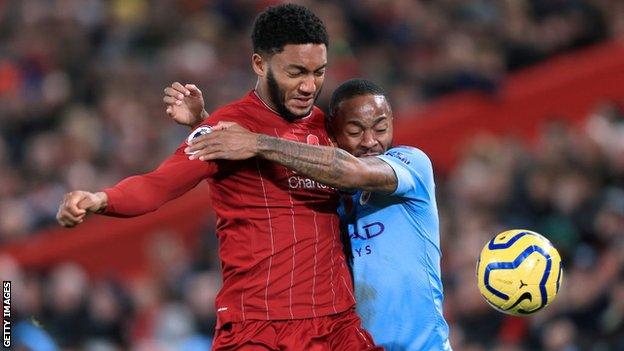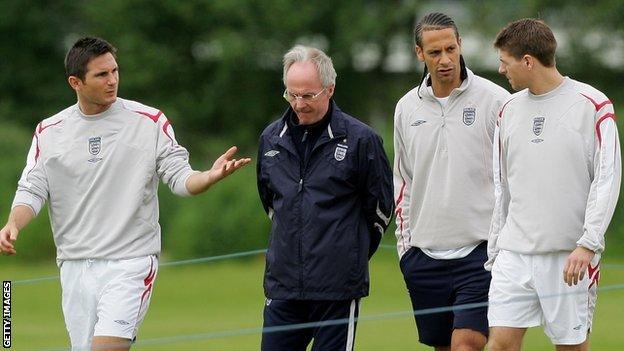Sterling-Gomez incident: Gareth Southgate 'facing his biggest test as England boss'
- Published

England team-mates Joe Gomez and Raheem Sterling during Sunday's Premier League match at Anfield, where Liverpool beat Manchester City 3-1
England manager Gareth Southgate faces the biggest test of his time in charge after dropping Raheem Sterling - arguably his most important player - following an altercation with Joe Gomez.
The ramifications for England and Southgate run much deeper and are potentially more long-term than the incident - described by the Football Association as "a disturbance" - that took place in a private team area at St George's Park when the squad assembled on Monday for their final two Euro 2020 qualifiers.
Southgate has dealt with the situation strongly and publicly once details of the confrontation between Sterling and Gomez emerged. It came the day after the pair had clashed late in Liverpool's highly charged 3-1 win over reigning Premier League champions Manchester City at Anfield, which put them firmly in control of the title race.
'Bad blood spilling over'
The test for Southgate now is to ensure there is no lingering ill-feeling that casts a shadow over his territory and disrupts the carefully assembled unity of this England squad.
Southgate has made this one of the cornerstones of his success after succeeding Sam Allardyce on a permanent basis in November 2016, guiding England to their first World Cup semi-final since 1990, and also to the brink of qualification for Euro 2020 with games against Montenegro and Kosovo to come.
This is an England squad that has been happy, unified and very much together - publicly and privately - and, most pertinently after what happened at St George's Park on Monday, free of the club cliques that have had an impact on the national team in the past.
The inter-club rivalry between players from Manchester City and Liverpool as they have established themselves as the two domestic super-powers has so far been amicable and fuelled England's improvement under Southgate.
Southgate, when announcing Sterling had been dropped, accepted this was one of his "great challenges" - but this is a clear case of club rivalries and lingering bad blood spilling over on to England's turf.
'No repeat of golden generation divides'
Southgate is well aware of the history of very high-profile players being divided along club lines while on England duty.
He and his staff will be keen to prevent this being the start of bigger divisions that would undermine much of the good work they have done in building this modern squad, a squad that has won great favour with the national team's supporters with their down-to-earth approach - and that all-important unity.
In his current squad, Liverpool have Gomez, Trent Alexander-Arnold, Jordan Henderson and Alex Oxlade-Chamberlain while City have Sterling and John Stones.
In the era of Sven-Goran Eriksson's so-called 'golden generation', the battle for supremacy between, in particular, Chelsea, Manchester United and Liverpool led to England's squad being divided on club lines, to the detriment of the team and the great talent involved.
There was talk of players sitting on separate tables, with Manchester United defender Rio Ferdinand admitting that their failure, and Eriksson's failure, to ensure that was set to one side "held us back", with Liverpool captain Steven Gerrard saying there was "respect" but no "love".

Frank Lampard (left), Rio Ferdinand (second from right) and and Steven Gerrard (right) all played under Eriksson (second left) at the 2006 World Cup in Germany
Southgate has always been aware of the potential risks of club matters boiling over - before the Uefa Nations League finals in Portugal in June, he addressed the challenge as he spoke before Arsenal faced Chelsea in the Europa League final and Liverpool met Tottenham in the Champions League final.
He said: "They've got to park the rivalry, that intense rivalry that's going to grow, and make sure we keep what has made us powerful over the last period of time as an England team."
Little did he realise he would be put to the test so soon.
Should Southgate have gone public?
Southgate will have carefully weighed up the decision to go public with his punishment of Sterling - already criticised by former England internationals such as Rio Ferdinand - but clearly feels the potential damage means he has to deliver a public show of strength.
Many will argue such matters should be kept in-house, but once the decision to drop Sterling was taken, it had to be explained and, given the headlines surrounding the incident, no-one would have bought a convenient injury as a reason for him missing the Montenegro game.
The England manager has shown authority and leadership.
What now for Sterling?
Sterling is understood to have offered his apologies and publicly admitted "emotions got the better" of him - but this was still not enough to stop Southgate excluding him from what the FA regard as a showpiece occasion against Montenegro at Wembley on Thursday, when they will play their 1,000th game with accompanying ceremonials.
This is a big decision by Southgate but one he has taken without hesitation. Sterling's rise to prominence with Manchester City and England has made him Southgate's most high-profile star - in his past 10 games for England he has scored 10 goals and has five assists.
He has become an increasingly mature figure in recent years, an eloquent spokesman in the fight against racism as well as a world-class footballer for City and England.
The statement he issued was full of contrition and a desire to leave this affair behind and move on - there is no reason to suggest Sterling's form or attitude will be affected by what amounts to a very public dressing down.
It is sometimes the off-field hazards that can derail as much as those on the pitch - now Southgate must get right on top of any residual ill-feeling which, for all the apologies and contrition, will still be a danger as the competition gets fiercer between Liverpool and City.
Southgate has acted strongly, noting in his statement that the decision was taken swiftly "with the agreement of the entire squad", and shown again no player is above his law.
It is a decision that may bring very short-term pain but Southgate is convinced it will have long-term gain.
Southgate's five biggest tests
Healing the post-Allardyce wounds: Southgate needed to steer England into calmer waters following Sam Allardyce's departure in September 2016 after he was caught in a newspaper sting.
Handling Rooney's decline: When Southgate was appointed England manager, he was rightly irritated by charges he was "too nice" for the ruthless cut-and-thrust of international management - he showed his steel by dropping captain Wayne Rooney for the World Cup qualifier in Slovenia, only his second game in caretaker charge.
Tackling racism: Southgate has been at the forefront of tackling racism, most prominently when England's players were abused in Montenegro and again against Bulgaria in Sofia recently.
Ruthless decision-making: Manchester City's Kyle Walker can testify to that. He has simply dropped off the England radar despite being a long-time regular and a cornerstone of England's World Cup campaign in Russia in 2018. Southgate believes he has better options - so Walker is gone.
Sterling sanctioned: Southgate was in no mood to spare his most important player, despite his influence, when Raheem Sterling was involved in his bust-up with Joe Gomez. No messing - dropped for the game with Montenegro at Wembley and a strong statement of exactly why and how important it was for the whole squad that strong action was taken.